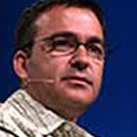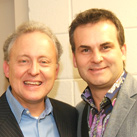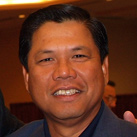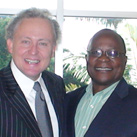The Measurement of a Man: Acts Series #34
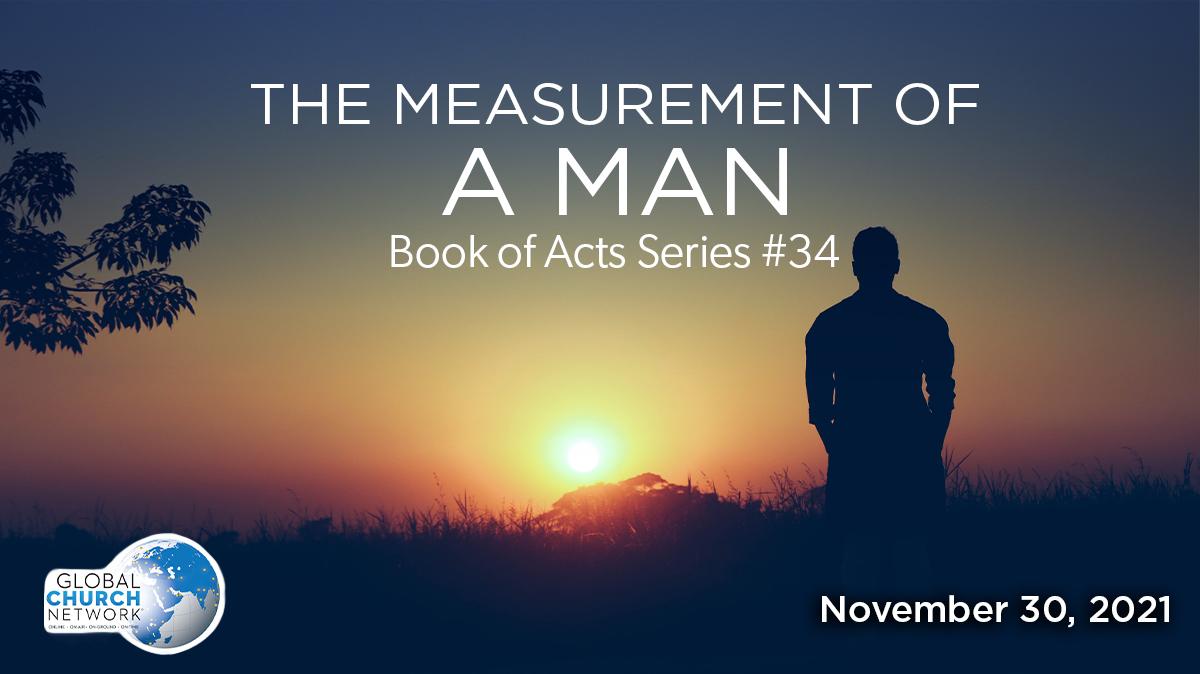
The Apostle Paul was revisiting a strategic mission field, the Bible tells us, and as he came to Miletus, he gathered with him the elders of the Ephesian Church. He took the time to walk and talk with them down memory lane. They talked about the good times they had had together and how God had blessed and poured out His blessings. Paul rehearsed it all. Here is what happened next, starting from Acts 20:36.
 “And when he had thus spoken, he kneeled down and prayed with them all. And they all wept sore and fell on Paul’s neck and kissed him, sorrowing most of all for the words that he spoke that they should seek his face no more, and they accompanied him to the ship.”
“And when he had thus spoken, he kneeled down and prayed with them all. And they all wept sore and fell on Paul’s neck and kissed him, sorrowing most of all for the words that he spoke that they should seek his face no more, and they accompanied him to the ship.”
Now use your imagination with me. They were one, tied, in the bonds of love. They had been through so many prayer meetings and evangelistic crusades together; they’d had so many victories in Christ, that their hearts were melded together. Now, they’re having a prayer meeting again on their knees and there is a sweet presence of God’s Spirit. And as they’re praying, they realize this is the last prayer meeting they’ll ever have on Earth with Paul the Apostle.
They began to weep. Not just a few tears, they were convulsing. The Bible says, “they wept sorely.” And then, they began to hug Paul. The Bible says they fell on his neck. They’re weeping and squeezing him and hugging him because they know they’ll never see Paul again. They walked down to the wharf where the ship was, as Paul got on the ship. They were parting for the last time.
We are all going to go. All of us are. We may move out of our city, but that’s nothing compared to the eternal move we’re all going to make. The question we each have to answer is, when we go, what difference will it make? Will your life have had any impact at all?
There is a popular joke about a man who had surgery. He woke up in the recovery room and all the windows were covered with curtains. The blinds were drawn and it was dark. He called to the nurse, “Nurse, open the windows. I want to see outside. Who closed the blinds anyway?”
There is a popular joke about a man who had surgery. He woke up in the recovery room and all the windows were covered with curtains. The blinds were drawn and it was dark. He called to the nurse, “Nurse, open the windows. I want to see outside. Who closed the blinds anyway?”
Some of us may not wake up on the other side and see flames, but we may wake up and find our entire lives were not a success. We may find we have wasted our life and are going into eternity with a wasted life. When we go, we will leave behind all that we “have,” and take only what we “are.” When the world measures a man, they measure him by his brain, his brawn or his bucks. How do you measure your life? How do you think a man is measured?
In the Guinness Book of World Records, there’s a man named Michael Letito. Do you know what his claim to fame is? He eats glass and metal. He grinds it up and he eats it. That’s right. He mixes it with his Wheaties and whatever else he eats. Since 1966, he’s eaten ten bicycles, an entire supermarket cart in four and a half days, six chandeliers and a Cessna light aircraft. Now can you imagine this fellow reporting to Christ?
“My son, what did you do when you were on the Earth?” “Lord, I ate an airplane once.”
What a claim to fame. I mean, what really counts?
What really matters? Are we going to be focused people? How will we measure life?
OUR MANNER MATTERS
 In the twentieth chapter in the book of Acts, we see the answer of how a man’s life is measured.
In the twentieth chapter in the book of Acts, we see the answer of how a man’s life is measured.
First, we learn that the manner of a man’s life matters. We measure a man by the manner of his life. From Miletus, the Bible says, Paul sent to Ephesus and called the elders of the church. When they came to him, he said, “You know, from the first day that I came to Asia, after what manner I have been with you in all seasons serving the Lord with all humility and mind and with many tears and temptations which befell me by the lying of weight of the Jews” (Acts 20:19).
So, what was the manner of his life? One way we see the manner of Paul’s life is that we see he led a life of humility, serving the Lord with all humility. There is no true greatness without true humility.
Humility is not putting yourself down. It is not saying you’re no good or that not loving yourself is humility. That couldn’t be true, because the Bible says that we are to love others as we love ourselves. We’re to love others as we love ourselves.
What is humility? Humility is an honest estimation of ourselves. It is saying about ourselves what God says about us. The result of humility can be seen primarily in serving.
Notice how Paul said, “serving the Lord with all humility.” The word “serving” is the verb from which we get the noun, “dulas,” which means “bond-slave.” Do you know what the mark of humility is? Serving others. A humble person is a person who serves other people. I’ve often said in our quest to reach one billion people, that if you don’t mind being the last zero in the billion, then you can add value to everyone in front of you. It is not the first zero that matters most. It is the last one that adds the most value.
When God measures a man’s life, he does not measure that man’s life by how many servants a man has, but by how many men the man has served.
There are a lot of men whose lives are going to amount to less than a zero. I’ll tell you why. They never learned how to serve. They go to church on Sunday morning and soak it up, but they do not serve. We each need to find a place of service in our church, in our communities, and in our homes. We each need to ask God, “Lord, help me to be a servant.” Unless we’re truly servants, we will never be truly missed when we’re gone.
Not only did Paul live a life of humility, but his manner of life included a life of heartache. In that passage of scripture, Paul wrote, “serving the Lord with all humility and all tears.” The Apostle Paul had a broken heart. Paul knew how to weep. He knew how to endure the sorrows and hurts of other people. That’s the way to be missed. If we live for self and self alone, we will try to insulate ourselves from the cares, toils, and problems of the world. When we insulate ourselves from people and their problems, we’re not going to be missed. We need to be men who know how to sympathize, men who know how to empathize, and men who have the compassion of the Lord Jesus in our hearts and lives.
Some men don’t cry. Perhaps it’s been a while since you wept. For many men, we were taught not to cry, not to show emotion. Here is a simple way to learn to weep, even if you’ve never wept before. Get into prayer and ask Jesus to let you see the world as He sees it. Allow the things that break the heart of Jesus to break your heart.
Shed tears over those you know who have mortgaged their soul to the devil.
Allow yourself to feel the bitter pain of their eternal destiny.
When we read the ministry of the Apostle Paul, we don’t often read about him weeping. The only way we know about it in this passage is because he wrote it. He told us. It would appear that most of the time, he wept in private. I can say from my own life that I’ve shed more tears in my private time than I have in my public time.
“I’m writing out of deep conviction,” Paul wrote. Jesus was a man of tears. Paul was a man of tears. Jeremiah was a man of tears. It would behoove us to see their example.
The Apostle Paul said, “I serve the Lord with humility, I serve the Lord with heartache.” Then he said, “I’ve served the Lord with hardship.”
We learn of some of the trials that befell Paul in the same passage we already read. Paul faced and fought many trials. There were people that disliked him. There were people who were opposed to him. There were men who physically harmed him because of the stand he took for Jesus Christ. There were people who conspired against him, who were out to get him.
There is no way that we can have a life that counts and make an impression on this world without making some enemies along the way. Unless we’re willing to have this manner of life, where we have these three things—humility, heartache, and hardship—we’re not going to have the kind of life that Paul had. Without those three, we’re not going to have the kind of life that counts.
A man may say, “I don’t want that kind of life.” Well, maybe he doesn’t. Maybe he just wants to be wrapped up in himself, which as was written earlier, makes a pretty small package. But we know that when he’s gone, it’s not going to make much difference. Nobody in this world will say, “That’s the way to have a huge spirit in your life.”
OUR MESSAGE MATTERS
 Paul had a manner of life and a message in life. Not only do we live a certain way, but we say a certain thing. We’re going to leave behind a message. Every one of us will be known for something we’ve communicated when we’re gone. What do you want people to remember about your message? Would they say, “The Gospel of Christ”? That’s what I’d like people to say. “This man’s life was centered on the message that really matters.”
Paul had a manner of life and a message in life. Not only do we live a certain way, but we say a certain thing. We’re going to leave behind a message. Every one of us will be known for something we’ve communicated when we’re gone. What do you want people to remember about your message? Would they say, “The Gospel of Christ”? That’s what I’d like people to say. “This man’s life was centered on the message that really matters.”
Paul wrote, “and how I kept back nothing that was profitable unto you, but have taught you and shown you from house to house that is in ever place, testifying both to the Jews and also the Greeks, and that’s in every person repentance toward God and faith toward the Lord Jesus Christ” (Acts 20:20).
The content of Paul’s message was repentance and faith—repentance toward God and faith in our Lord Jesus Christ. Paul was known primarily as a Gospel preacher. He had a narrow message.
Paul’s content had conviction in it. “And now behold I go bound in the Spirit into Jerusalem, not knowing the things that shall befall me, there accept that the Holy Spirit witnesses that in every city saying ‘bonds and afflictions abide me’” (Acts 20:22).
In more modern language, Paul wrote, “I’m going back to Jerusalem, the Spirit of God wants me to go. I’m bound in the Spirit. That is, I know God’s Will for me is to go, and I know that when I get there I’m going to have heartache and trouble.”
Then Paul wrote, “but none of these things move me” (Acts 20:24). Another translation interprets it, “I don’t get stampeded by any of these things.”
Paul wrote, “Neither count I my life dear unto myself so that I might finish my course with joy and the minutes for which I’ve received the Lord Jesus Christ testify the Gospel, the Grace of God.”
If we want a life that counts, we’re going to have to have a message that has the right content and the right conviction. “I’m bound in the Spirit,” Paul wrote. “None of these things moved me, you’re not going to stop me.”
Paul had a bulldog grip on certain things. The average man holds opinions and not convictions. But Paul was a man of deep conviction.
Paul wrote, “I’m bound in the Spirit, I’m going to finish my course with joy, I will do it. I know what I’m going to do, I will eventually be lead to death.”
We can see from his writing that Paul would have rather died with a conviction than live with a compromise.
How can we become that focused in our lives? Most of us would far rather live with a compromise than die with a conviction, but we can also understand as we examine his message how Paul became the man that he was.
Paul also had a confidence in his message. Paul died with tremendous confidence.
 He wrote, “And now behold, I know that among whom I have gone preaching, the Kingdom of God shall see my face no more. Wherefore I take you to record this day that I am pure from the blood of all men, for I have not shunned to declare to all the council of God” (Acts 20:25).
He wrote, “And now behold, I know that among whom I have gone preaching, the Kingdom of God shall see my face no more. Wherefore I take you to record this day that I am pure from the blood of all men, for I have not shunned to declare to all the council of God” (Acts 20:25).
In modern language, Paul said, “You’re not going to see me anymore, I’m going to Heaven. But I’m going to tell you one thing, I’m pure from the blood of all men.”
Paul was moved for the souls of men. When he wrote this, he was talking about soul winning. In other words, if we don’t tell our friends or neighbors, and if we don’t tell our brothers and sisters about the Lord Jesus Christ, Paul is inferring that their blood is on our hands.
That is a focused life. Paul made a statement that could only be made by a man who had chosen to stay “on message” until his job was finished. The Apostle Paul knew that before long, he was going to meet the Lord. In view of that, he said, “I am pure. I am free from the blood of all men. I’m not going to face the Lord with bloody hands.”
How many men do you know who know their favorite team’s statistics, but don’t know the names of the lost people that live next door? Do you know a man like that? We have to ask—how is that man going to face the Lord? Will he have blood on his hands?
I can see in my mind’s eye the Apostle Paul in prison, tired and aware that his execution is about to come. The burly guard comes toward him.
“Paul, come.”
“Where are we going?”
“We’re going to the chopping block, Paul. We’re going to execute you.”
The guard approached Paul with a chain to bind him. Paul says, “You don’t need to put a chain on me. I can walk. It’s alright.”
So the guard took Paul and they began to walk down toward the Tiber River, the river that would soon drink the blood of this great man of God. There he goes, the greatest Christian who ever lived. Can you see a hump- backed, older Jewish man, hobbling along, his body bent, broken, and scarred from with the whippings, stonings, and imprisonments.
The guard asked, “Do I hear music? Are you humming?”
“Oh, yes. I didn’t know you were listening to me. It’s just a song we love to sing—‘It will be worth it all when we see Jesus.’”
The guard snarled, “You’re a strange one.”
They came down to the river where the executioner was waiting.The executioner ordered, “Tie him to the chopping block.”
Paul quietly said, “You don’t need to tie me down. It’s alright.”
Paul knelt down, putting his head on the chopping block. They questioned, “Aren’t you afraid, Paul?”
“Oh,” he said, “I’ve done this before.”
“You can’t have done this before!”
“I’ve died daily,” Paul said, with a faraway look in his eyes, knowing the end was here and he would soon see His Savior, the one he had faithfully served.
Paul didn’t resist as they put his head on the chopping block. If they asked for his last words, I’m almost certain the Apostle would have said, “Jesus Christ is Lord. Jesus died and rose from the dead for you.”
The ax fell and Paul was beheaded.
I would like to imagine that the next instant Paul was in heaven, saying to the Lord, “ Lord Jesus, you know I wasn’t strong, I was not handsome, I didn’t have a good voice, I didn’t have much money, I didn’t have many possessions, but Lord, I kept the faith, I finished my job. Lord, I fought a good fight. My race is over. Lord, these hands are pure from the blood of all men.”
What a great way to meet the Lord and enter eternity. I believe in the next instant, Paul would hear, “Well done, thou good and faithful servant. Enter thou into the joy of the Lord. Thank you, Paul, for being true to Me.”
We do not want to meet the Lord with bloody hands. Many men may make Heaven, but they will hold in their hands the ashes of a wasted life.
OUR MOTTO MATTERS
 How can we be focused in this life? We need to have the right manner and the right message, and the right motto. Every man has a motto for his life. Maybe it’s put into words and maybe it isn’t. There is something that impels him, motivates him, drives him, and constrains him. Paul could say these words:
How can we be focused in this life? We need to have the right manner and the right message, and the right motto. Every man has a motto for his life. Maybe it’s put into words and maybe it isn’t. There is something that impels him, motivates him, drives him, and constrains him. Paul could say these words:
“I have coveted no man’s silver or gold or apparel. You know these hands have ministered unto my necessities and unto them that were with me and I have showed you all things how that so laboring you ought to support the weak, and to remember the words of the Lord Jesus, how he said, ‘It is more blessed to give, than to receive.’”(Acts 20:33-34)
Paul had a manner, a message and also a motto. His motto was, “It is more blessed to give than to receive.” People can be divided into two categories. There are the takers and there are the givers. The takers eat better, the givers sleep better.
The Apostle Paul was a great man because he spent his life not primarily as a receiver but as a giver. As a result, Paul’s life was a blessed life. Scripture teaches us that it is more blessed to give than to receive.
What we have spent is gone forever. What we did not spend is left for others. But what we give away is ours forever.
Paul’s motto freed him from covetousness. He wrote, “I have coveted no man’s silver or gold or apparel” (Acts 20:33). Paul’s motto freed him from laziness. Paul pointed out his work hands and said, “I have ministered unto my necessities” (Acts 20:34). He was saying, “I have worked for my needs. Plus, there are people who are weak and there are people who can’t work, and there are people who have needs. I work so that I might help the needy.” Elsewhere in Scripture we read that if a man won’t work, neither should he eat. There are some people who can’t work and those of us who can work should work to help those who are weak.
When we die, we’re going to take with us only what we have given away.
Paul’s motto saved him from selfishness. Nobody has a greater life than the man who lives a selfless life. The Apostle Paul lived a life of giving, not taking, of helping, not hurting. He lived a life of loving, lifting, and caring.
During World War II, the Nazis went into a Polish village and accused all the Jews in that village of crimes against the State. They brought them out of their houses and took them to a field where they were made to dig a ditch that would later become their grave. The Nazis then stripped them of their clothes, lined up the Polish Jews and took machine guns to them. They mowed them down, bullet after bullet flying. The people fell, head over heels into the grave.
A little ten-year-old boy was standing there, naked, with his mother and father. The bullets ripped the parents’ bodies open. Blood splattered everywhere. As they fell, the little boy fell with them, but he was not touched by one bullet. He fell into the grave and lay still.
The Nazis saw he was splattered with blood and assumed he was dead like the others. They pushed dirt over these people and the little ten-year-old boy was buried alive. His face was in such a position that he caught a pocket of air. Because the ground was not packed that hard, he could actually breathe while lying on the mutilated bodies of his loved ones. After several hours when it became quiet and dark, he dug his way out of his own grave. He clawed and dug all the way to the surface. This young boy pulled himself out of the mass grave, naked, covered in blood and clotted with dirt.
He went to the house of a neighbor and knocked on the door. The woman who answered the door saw the little boy covered in dirt and blood and the remains of his grave. She recognized him as one of the Jewish boys and knew that he had been marked for death. She screamed at him, “Go away!” and slammed the door in his face.
The little boy dragged himself to another door and knocked. He begged the woman who answered for help but the same thing happened. The woman, in terror, said, “No, I cannot help you, go away.”
He went to the third door and knocked on that door and when the woman opened the door, she looked at him and her face froze. Before she could say anything he said to her, “Don’t you recognize me? I’m Jesus, that you say you love.” She broke and said, “Come in, come in.” At the risk of her own life she sheltered that ten-year-old child.
Jesus said, “As much as you have done unto the least of these, my brethren, you have done it unto Me.” There is no easy way to have a great life. Millions of men, when they are gone, will not be missed. When other men are gone, people will weep sorely for the loss. These are the men who know the things that count.
We must respond to this challenge by daring to become involved in the Great Commission Christ gave us, to help spread His Gospel down our street, across our city, throughout our nation and into other lands.
We respond to this challenge by facing the fear of being different from others, by courageously standing up and doing the right thing, by having a proper manner, a good message and by living out our lives according to the right motto.
Here is a prayer you can say right now that could make an eternal difference in your life. How do you measure your life? How have you chosen to walk out the track that God gives you for your life? Are you focused?
Be different. Dare to do what has never been done before in your family, at your work, in your community, church, or in the entire world.
Back To Blog
